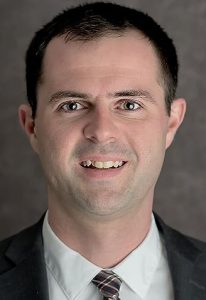U.S. society will continue to fragment into ever-shrinking political and religious clusters as long as Americans continue to shun those with different perspectives, sociologist of religion Ryan Burge said in a Denver Seminary podcast.
The trend has been highly visible in Christian denominations whose worship and ministry once were shared by Republican and Democratic members, but have more recently become known for expelling people over theological and political purity, said Burge, an American Baptist pastor and associate professor of political science at Eastern Illinois University.
“The easier thing to do is cloister ourselves and bubble ourselves and only surround ourselves with people who agree with us on everything,” he said. “The problem is every institution in America has made that easier and easier for us. We’re not going to mixed organizations anymore. Our workplaces are more politically homogenous than they have ever been. Our churches are more politically homogenous. Our social groups are more politically homogenous.”
His research and writing, including his “Graphs about Religion” Substack, have made Burge a go-to expert on the intersection of faith, culture and politics. He spoke on a recent episode of the “Engage 360” podcast moderated by Tim Koller, associate dean of academic affairs at Denver Seminary.
A goal of the episode was to promote the concept of a “charitable orthodoxy,” which is the idea that Christians with varying opinions and outlooks can find common ground to fellowship and worship together, Koller said. “It’s helpful to ask, ‘Are we going to a church because it is already confirming the political views that I hold, or am I in a space where I can actually be in congregation with people who hold different views than I do?’”
The danger of associating only with like-minded believers is a tendency to demonize those with divergent views, which in itself is a theological error, Burge said. “Anything that dehumanizes another person is antithetical to the gospel of Jesus Christ. That’s a universal principle. Left, right or center, no matter who you voted for, if your politics dehumanizes a person because of their gender identity, because of their racial background, because of their country of origin, then you have sinned against the kingdom of Heaven.”
But taking the more difficult approach of attempting to reach across those divides is healthier not only for the soul but for the nation, he said. “To start a conversation with someone I know I disagree with, and to see where it goes, helps us become more fully human and become more functional as members of a democracy, which is something we should really care about because we live in the greatest country on earth and it hinges upon us to maintain that democracy.”
Seeking and living in that middle ground once was much more common in the U.S., and even in denominations like the now-ultra conservative Southern Baptist Convention, he said. “It used to be the case that the SBC was a fairly big-ish tent, right? You had people who were moderates to people who were literalists. But now a process of purification has happened in the evangelical subculture to where Russell Moore is a liberal, now David French is a liberal, now Beth Moore is a liberal and they have to leave — they are not part of our flock.”
The trend is just as prevalent on the left, Burge noted. For example, in 2021 the American Humanist Association withdrew its 1996 Humanist of the Year Award from atheist author and biologist Richard Dawkins because of his tweet questioning the validity of transgender identity. More recently, Dawkins resigned from the board of the Freedom from Religion Foundation for redacting his article arguing gender is defined by biology.
“We don’t have any reason to compromise anymore.”
“We believe in all kinds of worldviews, except if you say something that violates our liberal orthodoxy, then we’re going to kick you out. So, it is this purification on both sides that’s killing America,” Burge said.
That it is possible for people who disagree on politics to worship together used to be demonstrated by the Mainline churches, he added. But their numbers have dwindled from about 50% of Americans in their heyday to 10% and declining today. “They were the moderate middle of American religion. They saw both sides. They had liberals and conservatives. And the problem is we don’t work in these spaces with people who are different. We don’t live in these spaces, we don’t worship in these spaces, and it’s going to tear us apart.”
It certainly tore Congress apart when rightwing Republicans removed Speaker of the House Kevin McCarthy from his post because he was not deemed conservative enough, Burge said. “There was a group on one side that said, ‘We are not going to compromise. We want the speaker we want or we’re going to vote.’ We are only going to see that accelerate on the right and the left in years to come because we don’t have any reason to compromise anymore. We are actually incentivized to dig our heels in, take the most extreme position and try to convince other people that we are right and we are normal.”
Pushing back against the forces of division requires individuals to pay attention to how they hear and process disagreeable ideas, he said. “And whatever we do, we cannot dehumanize people who vote for someone different than me. They are still people and they just believe something different about the world.”
Related articles:
Harsh times offer progressives an opportunity to restore Christianity’s good name | Opinion by Marv Knox
Jesus, politics and the purple church | Opinion by Chuck Poole
There is no center | Opinion by Mark Wingfield



